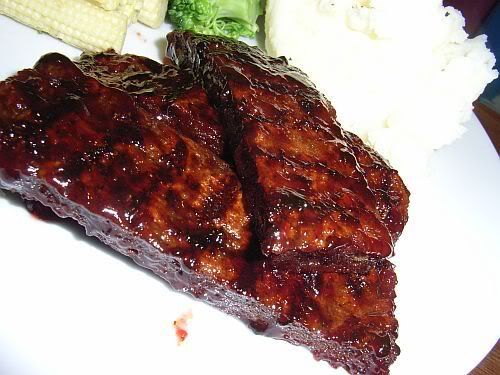- Evaporated Cane Juice
- Cane Juice
- Organic Sugar
- Turbinado
- Raw Sugar
- Molasses
I have many people asking why I don't eat some of the above listed sugars. I do eat molasses. A naturopathic doctor once recommended that I eat one tablespoon of molasses a day. I was eating vegan then. I haven't touched the other sugars all year because I believe they are much more refined products of sugar cane/sugar beet than molasses. Molasses is full of iron and other vitamins and minerals. You really can't overeat the stuff--it's so strong! It makes a wonderful sweetener, especially in my favorite gingersnap cookies.
I think that the other sugars listed are advertising "gimmicks" to get us health-concious folks to think a product is okay. I really don't believe that there is a big difference between white table sugar and evaporated cane juice, cane juice, raw sugar and turbinado. If the differences are microscopic, then I think they hardly count. I think the differences should be as obvious as molasses compared to white table sugar. If there are "trace" amounts of nutrition in cane juice or turbinado, does that really make it healthy?
The research that I am looking for is harder to find than I thought. All I want is a chart that shows the sugar refining process, with these different sugars listed at the point at which they are a final product. Ideally, these different sugar products would then be charted according to their nutrition. Do these charts exist? I've looked on both sugar websites and "anti-sugar" websites.
Wikipedia apparently agrees with me, "Evaporated cane juice is used more widely across the globe and is gaining currency as a euphemism for refined white sugar." I think "euphemism" is a loose term, and definitely not a scientific term, but nevertheless...
I'm finding the same thing on most websites, "[Evaporated cane juice] may also be known by a variety of other names including dried cane juice, crystallized cane juice, milled cane sugar and direct consumption sugar."(1)
If you've heard of Sunspire Natural Chocolates, they also have something to say about raw sugar, "Raw sugar is coarse, tan to brown-colored sugar (sucrose) which results from the first processing of cane or beet sugar. True "raw sugar" cannot be sold in the USA because it contains impurities such as soil, mold yeast, bacteria, and wax. When further processed to remove the impurities it is sold as turbinado sugar."(2)
Here is an interesting perspective written by Nutritionist Vimlan VanDien, "One hundred grams of dried cane juice is pretty much the same thing as 100 grams of other sweeteners, no matter what you call it," says Vimlan VanDien, a nutritionist at the respected Bastyr University, in Seattle, Washington. "When people call these sugars something other than sugar, it's deceptive in a way if the market is uninformed. Because dehydrated cane juice is sugar. It simply sounds like a whole food."
VanDien feels that calling these sweeteners something other than what they are is a way that some consumers can sugarcoat their consciences too.
"To a certain extent," she explains, "when people buy products with so-called alternative sweeteners, it gives them an excuse to eat sugar. They'll say, Oh, it's organic, so it's O.K.' Or, It's a whole food.' But it's not whole food. If you wanted the whole food, you'd go out in the field and eat the sugar cane, and get all the fiber and nutrients it has." (3)
I found a sugar refining website (4) that talks about the process of sugar refining, but leaves out when the various sugar products are produced. The sugar refining process is very interesting to me. It reminds me that sugar is in no way a whole food. What once was a beautiful green sugar cane (sold at open markets in Hawaii and fun to chew on) ends up an embarrassed little pile of tiny white, nutrition-less crystals.
Ah, I should write a children's book about the sugar refining process from the sugar cane's point of view. Poor guy.
(1) (-http://www.whfoods.com/genpage.php?tname=foodspice&dbid=120)
(2) (http://www.worldpantry.com/cgi-bin/ncommerce3/ExecMacro/nspired/sunspire/faq.d2w/report#gsweet)
(3) (http://organicanews.com/news/article.cfm?story_id=23)
(4) (http://www.refinedsugar.org/)

